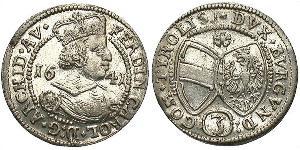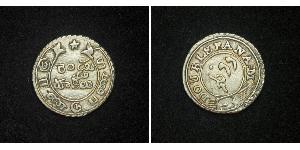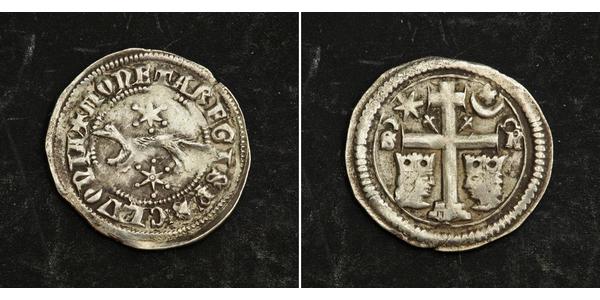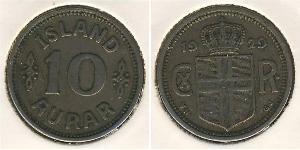(Verkauft für $31.0)
1275, Hungary/Croatia (Slavonia), Stephen V. Silver Banovac Denar Coin. R!
Mint Period: 1270-1272 Reference: Rengjeo 129. R! Mint Place: Zagreb (Croatia) Denomination: Denar (Banovac) State: Slavonia (today´s Croatia) Condition: Dark oxidation deposits, minor roughness spots, otherwise VF-XF! Diameter: 16mm Weight: 0.82gm Material: Silver
Obverse: Marten advancing left, star above and below. Legend: +MOnETAWREGISpSCLAVOnIA Reverse: Patriarchal cross; star and crescent across upper field, crowned heads facing one another across lower field. Comment: Letters (S-R) below omega symbols in fields.
Slavonia (Croatian and Bosnian: Slavonija, Serbian: Slavonija, Hungarian: Szlavónia, Latin: Sclavonia) is a geographical and historical region in eastern Croatia. It is a fertile agricultural and forested lowland bounded, in part, by the Drava river in the north, the Sava river in the south, and the Danube river in the east.
Authenticity Unconditionally guaranteed.
Stephen V (Hungarian: V. István, Croatian: Stjepan VI., Slovak: Štefan V) (before 18 October 1239, Buda, Hungary – 6 August 1272, Csepel Island, Hungary), King of Hungary 1246-1272).
He was the elder son of King Béla IV of Hungary and his queen, Maria Laskarina, a daughter of the Emperor Theodore I Lascaris of Nicaea.
In the second year following his birth, on 11 April 1241, the Mongolian troops defeated his father's army in the Battle of Mohi. After the disastrous battle, the royal family had to escape to Trau, a well-fortified city in Dalmatia. They could only return to Hungary after the unexpected withdrawal of the Mongol forces from Europe..
In 1246 Stephen was crowned as junior King and his father entrusted him with the government of Croatia, Slavonia and Dalmatia, but the three provinces were de facto governed by the Ban Stephen Gut-Keled. Stephen's father, attempting to bind the powerful but pagan Cuman tribes more closely to the dynasty, arranged for Stephen's marriage, as a youth (about 1253), to Elizabeth, the daughter of a Cuman chieftain Köten.
In 1257, Stephen demanded his father to divide the kingdom between themselves and recruited an army against the senior king. Finally, in 1258, King Béla IV was obliged to cede him the government of Transylvania.
Stephen took part in his father's military campaign against the Styrians, who had rebelled against the rule of the King of Hungary, in 1258. After the successful campaign, King Béla IV appointed him to Duke of Styria.
His government, however, was unpopular among his new subjects, who rebelled against him with the support of King Otakar II of Bohemia. Stephen and his father started an attack against Otakar II's lands, but their troops were defeated on 12 July 1260 in the Battle of Kroissenbrunn. Following the battle, the two Kings of Hungary ceded the Duchy of Styria to the King of Bohemia in the Peace of Pozsony (Slovak: Bratislava).
Shortly after the peace, Stephen took over again the government of Transylvania. In 1261, Stephen and his father made a joint military campaign against Bulgaria, but their relationship became more and more tense, because the senior king had been favouring his younger son, Duke Béla of Slavonia and his daughter, Anna, the mother-in-law of the King of Bohemia.
Finally, with the mediation of Archbishops Fülöp of Esztergom and Smaragd of Kalocsa, Stephen and his father signed an agreement in the summer of 1262 in Pozsony. Based on their agreement, Stephen took over the government of the parts of the kingdom East of the Danube. However, the two kings' reconciliation was only temporary, because their partisans were continuously inciteting them against each other. In 1264, Stephen seized his mother's and sister's estates in his domains, but his father sent troops against him. Stephen's wife and son was captured by his father's partisans, and he had to retreat to the castle of Feketehalom. However, he managed to repeal the siege and to commence a counter-attack.
In March 1265, he gained a strategic victory over his father's army in the Battle of Isaszeg. After his victory, he concluded a peace with King Béla IV. Based on the provisions of the peace, he received back the government of the Eastern parts of the kingdom. On 23 March 1266, father and son confirmed the peace in the Convent of the Blessed Virgin on the Nyulak szigete ('Rabbits' Island'). Shortly afterwards, Stephen V lead his army to Bulgaria and forced Despot Jakov Svetoslav of Vidin to accept his overlordship.
In 1267, the "prelates and nobles" of the Kingdom of Hungary held a joint assembly in Esztergom, and their decisions were confirmed by both Stephen and his father.
To secure foreign support, he formed a double matrimonial alliance with the Angevins, chief partisans of the pope. The first of these was the marriage, in 1270, of his daughter Maria to the future King Charles II of Naples The second alliance was the marriage of Stephen's infant son, Ladislaus to Charles II's sister Elisabeth.
After his father's death (3 May 1270), Stephen inherited the whole Kingdom of Hungary, although the deceased senior king had entrusted his daughter, Anna and his followers to King Otakar II of Bohemia in his last will, and they had escaped to Prague before Stephen arrived to Esztergom.
Before his (second) coronation, Stephen granted the County of Esztergom to the Archbishop. In August 1270, Stephen had a meeting with his brother-in-law, Prince Boleslaw V of Poland in Kraków where they concluded an alliance against the King of Bohemia. Stephen also had a meeting with King Otakar II on 16 October on an island of the Danube near to Pozso ny where they concluded a truce for two years.
However, following smaller skirmishes on the border, the war broke out soon and the King of Bohemia lead his armies against Hungary. Stephen was defeated in two smaller battles, but finally he defeated a few important castles. In the subsequent peace the King of Bohemia handed back the fortresses occupied during its campaign, while Stephen renounced its claim for the Hungarian royal treasury that his sister, Anna had brought to Prague after their father's death.
In the summer of 1272, Stephen left for Dalmatia, where he wanted to meet King Charles I of Sicily, when he was informed that Joachim Gut-Keled kidnapped his infant son, Ladislaus. Stephen was planning to raise an army to rescue his infant son, when he died suddenly.

|
Beigetragen von:
anonymous 2017-06-06 |

1 Dinar Kroatien Silber Béla IV. (Ungarn ...
Diese Gruppe hat 22 Münzen / 20 Preise
Add coin to this group

1 Shilling Vereinigtes Königreich von Gr ...
Diese Gruppe hat 10 Münzen / 10 Preise
Add coin to this group

1 Sixpence / 6 Penny Vereinigtes Königre ...
Diese Gruppe hat 3 Münzen / 2 Preise
Add coin to this group

3 Kreuzer Österreich Silber Ferdinand Ka ...
Diese Gruppe hat 20 Münzen / 19 Preise
Add coin to this group

1 Obol Antikes Griechenland (1100BC-330) ...
Diese Gruppe hat 6 Münzen / 4 Preise
Add coin to this group

1/2 Sovereign Vereinigtes Königreich Gol ...
Diese Gruppe hat 35 Münzen / 32 Preise
Add coin to this group

2 Fanam Britische Ostindien-Kompanie (17 ...
Diese Gruppe hat 2 Münzen / 2 Preise
Add coin to this group
1 Franc Reunion Kupfer
Diese Gruppe hat 4 Münzen / 3 Preise
⇑


















